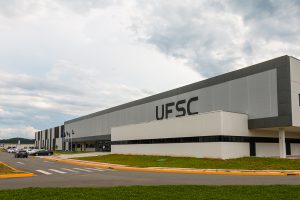Nutrition
 UFSC Nutrition program aims to prepare professionals who are committed to the improvement of people’s quality of life. The nutritionist applies knowledge of dietetics and considers nutrition as a fundamental factor influencing human growth and development throughout all life stages, from gestation to childhood, adolescence, adulthood, and late adulthood.
UFSC Nutrition program aims to prepare professionals who are committed to the improvement of people’s quality of life. The nutritionist applies knowledge of dietetics and considers nutrition as a fundamental factor influencing human growth and development throughout all life stages, from gestation to childhood, adolescence, adulthood, and late adulthood.
Students are trained to perform the following tasks: assessment and monitoring of the nutritional status of the population (preschoolers, children, adolescents, athletes, among others); evaluation of the quality of school meals; surveillance of the nutritional status of the population in schools and health units; elaboration of quality projects for the production of collective and commercial meals; disease prevention, recovery and health promotion of the population, through nutritional counseling and diet therapy; development of experimental research on food; and development of education actions on health and nutrition for individuals and communities.
Since the early stages, courses provide contact opportunities with the professional activities. From the third year on, theoretical-practical courses are offered in the fields of basic nutrition, clinical nutrition, experimental nutrition, public health, food service management and sports nutrition.
The University Hospital (HU) as well as other public and private partner institutions are learning settings for practical courses, short internships, and curricular and extracurricular internships. Students can develop activities at several well-equipped laboratories (Experimental Nutrition, Nutritional Biochemistry I and II, Dietetics, Anthropometry and Ergonomics, Means for Collective Feeding, Means for Nutritional Education) and at the HU’s outpatient nutrition clinics.
UFSC Nutrition program is the only one in Brazil that has a metabolic unit, located at the University Hospital, which enables studies on the absorption of food by the human body, and the only one to have a Junior Enterprise in Nutrition. Students can apply for scholarships in the Tutorial Education Program (PET), offered by the Ministry of Education, and for research, outreach or student tutoring scholarships, besides working as volunteers in projects of the Department of Nutrition. Graduates can follow a career in the fields of clinical nutrition, public health, experimental nutrition, food service management, and sports nutrition.
Nutritionists work across a variety of settings, including hospitals, clinics, spas, health units, child care centers, collective and commercial food service establishments, industries, sports centers, clubs, gyms, companies, and public institutions involved in food programs. They are also active in marketing and consulting, customer service, research on new food products, diet and low-calorie options, quality assurance in meal production, and programs promoting healthy eating habits in diverse populations, working in collaboration with multidisciplinary teams.
Profile of the graduate:
A Nutrition graduate should be a socially responsible professional with a well-rounded education. They should be autonomous in their pursuit of knowledge, sensitive and critical towards social, economic, political, and cultural realities, and have a holistic understanding of humanity and the world. Equipped to act as agents of transformation, they should work with commitment, ethics, sustainability, and interdisciplinarity across all areas where food and nutrition are pivotal to the promotion, maintenance, and restoration of health for individuals and communities.
| Program Length: 10 semesters (5 years) |
| Website: www.nutricao.ufsc.br |
| Classes held during the day. |





 The Naval Architecture and Marine Engineering program provides students with a systemic view of engineering, developed through a diversified curriculum, that prepares them for a career in planning, construction, maintenance and disposal of naval systems – including conventional and special vessels, as well as port and oceanic structures.
The Naval Architecture and Marine Engineering program provides students with a systemic view of engineering, developed through a diversified curriculum, that prepares them for a career in planning, construction, maintenance and disposal of naval systems – including conventional and special vessels, as well as port and oceanic structures. Considering the significant number of museums throughout the state of Santa Catarina and the shortage of professionals in the field, the UFSC Museum Studies program was established to prepare professionals capable of guiding education, conservation, and cultural policies related to heritage assets.
Considering the significant number of museums throughout the state of Santa Catarina and the shortage of professionals in the field, the UFSC Museum Studies program was established to prepare professionals capable of guiding education, conservation, and cultural policies related to heritage assets. The UFSC Product Design program is structured to integrate various areas of knowledge, deepen expertise in product design, and synthesize acquired knowledge to address project challenges, fostering closer ties between students and the industry.
The UFSC Product Design program is structured to integrate various areas of knowledge, deepen expertise in product design, and synthesize acquired knowledge to address project challenges, fostering closer ties between students and the industry.